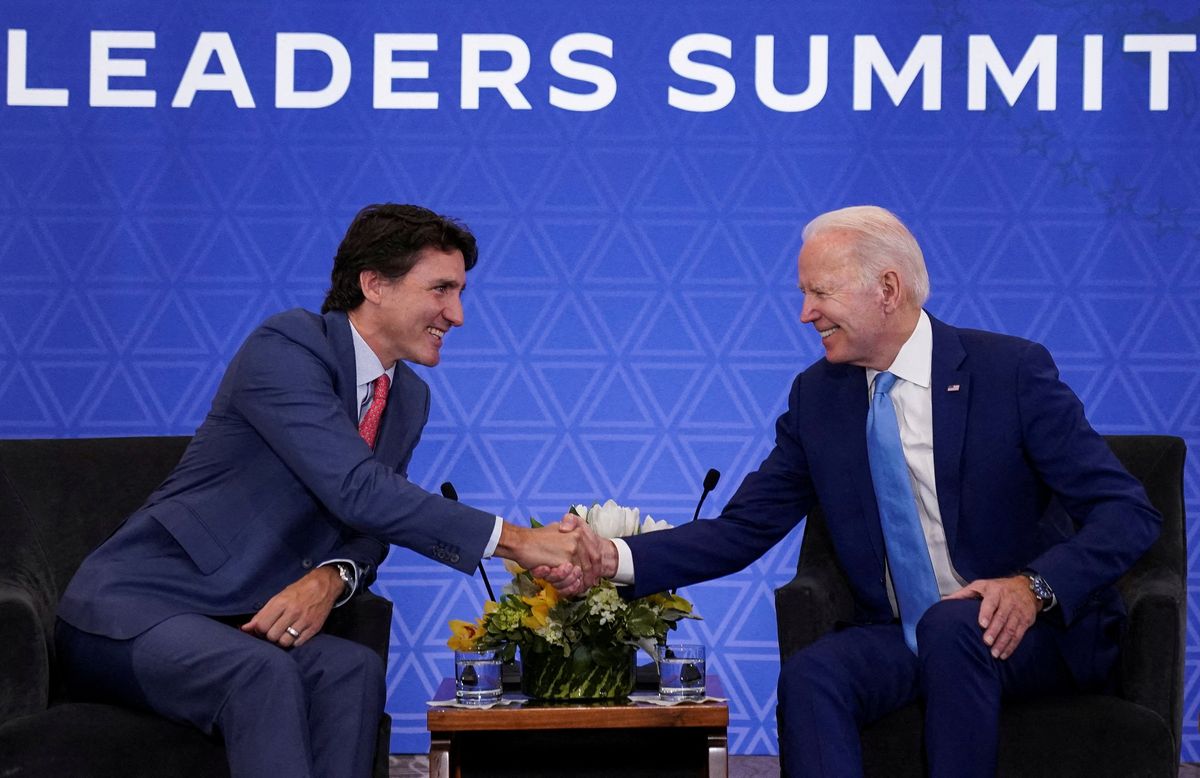Amid the pomp and pageantry accompanying President Joe Biden’s first official visit to Canada, he and Canadian PM Justin Trudeau are looking to make some deals.
Even before Biden’s arrival late Thursday, news broke that the two countries had reached an agreement on irregular migration flows across the US-Canada border, a sticking point for both governments. An influx of asylum-seekers across the Roxham Road crossing into Quebec has dogged relations, with nearly 40,000 migrants crossing in 2022 alone.
Trudeau has been asking the US to renegotiate the Safe Third Country Agreement, which requires asylum-seekers who cross select border points to be sent back to the country where they first entered. Why? Because it encourages migrants to enter at irregular crossings like Roxham Road, and once they’re in Canada they can legally make asylum claims.
The precise details of the new migration deal are still under wraps, but Canada has reportedly agreed to take in 15,000 migrants from the Western Hemisphere through official channels. The agreement also would reportedly allow both countries to turn away asylum-seekers who cross the border without authorization.
The Biden-Trudeau talks on Friday are also expected to turn to defense. Last month’s Chinese spy balloon fiasco has led to increased pressure on both leaders to ramp up security. North Korean missile tests and Russian advances in missile technology have added more urgency to North American defense.
A new Maru Public/GZERO poll finds that the vast majority of Americans and Canadians (93% and 91%, respectively) want the two countries to boost security efforts, and most Canadians favor either a joint missile-defense system or having US missiles on Canadian soil.
With both Canada and the US being behind on the modernization of the North American Aerospace Defense Command – much of its radar systems are from the 1980s – Friday’s discussions are likely to touch on NORAD investment.
Biden is expected to push Trudeau on military spending – like many NATO members, Canada lags behind its defense spending target of 2% GDP. Canadian NORAD officials complain that current military capabilities are sluggish. Last year, Trudeau’s government pledged $4.9 billion to upgrade NORAD, but Americans are skeptical about the speed at which Canada can deliver.
The war in Ukraine is also putting Arctic defense back on the map. The Maru/GZERO poll showed that majorities in both the US and Canada support a joint military presence in the Arctic. Receding ice in the region has freed up shipping lanes, portending new access to lucrative resources like oil and rare-earth minerals. The region’s security would take on even more geopolitical importance should Finland and Sweden join NATO, possibly making it a new frontline pitting Russia against the West.
There's no shortage of thorny issues for Biden and Trudeau to tackle, from defense and immigration to trade and Ukraine. For more on the presidential visit, be sure to join us on Twitter Friday at 12pm ET. We’ll be talking with Forbes' Diane Brady, Eurasia Group's Gerald Butts, and GZERO's Evan Solomon, breaking down what Biden and Trudeau need to accomplish during their meeting. Set a reminder here.
To stay up to date on crucial US-Canada relations, be sure to subscribe to our new newsletter, GZERO North.

















